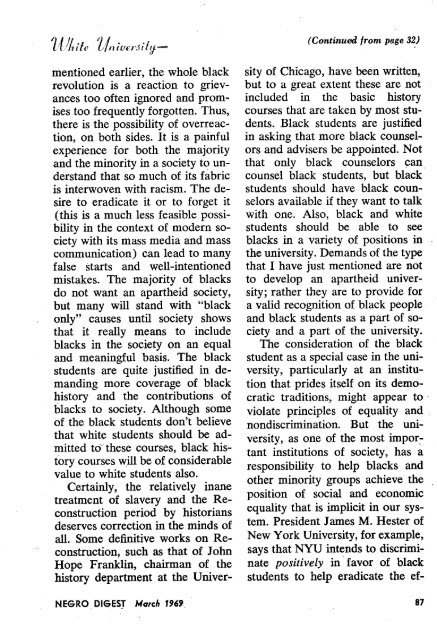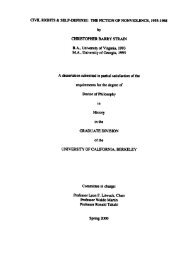Negro Digest - Freedom Archives
Negro Digest - Freedom Archives
Negro Digest - Freedom Archives
You also want an ePaper? Increase the reach of your titles
YUMPU automatically turns print PDFs into web optimized ePapers that Google loves.
mentioned earlier, the whole black<br />
revolution is a reaction to grievances<br />
too often ignored and promises<br />
too frequently forgotten . Thus,<br />
there is the possibility of overreaction,<br />
on both sides . It is a painful<br />
experience for both the majority<br />
and the minority in a society to understand<br />
that so much of its fabric<br />
is interwoven with racism . The desire<br />
to eradicate it or to forget it<br />
(this is a much less feasible possibility<br />
in the context of modern society<br />
with its mass media and mass<br />
communication) can lead to many<br />
false starts and well-intentioned<br />
mistakes. The majority of blacks<br />
do not want an apartheid society,<br />
but many will stand with "black<br />
only" causes until society shows<br />
that it really means to include<br />
blacks in the society on an equal<br />
and meaningful basis .<br />
The black<br />
students are quite justified in demanding<br />
more coverage of black<br />
history and the contributions of<br />
blacks to society . Although some<br />
of the black students don't believe<br />
that white students should be admitted<br />
to these courses, black history<br />
courses will be of considerable<br />
value to white students also .<br />
Certainly, the relatively inane<br />
treatment of slavery and the Reconstruction<br />
period by historians<br />
deserves correction in the minds of<br />
all . Some definitive works on Reconstruction,<br />
such as that of John<br />
Hope Franklin, chairman of the<br />
history department at the Univer-<br />
NEGRO, DIGEST March 1969.,<br />
(Continued from page 32)<br />
sity of Chicago, have been written,<br />
but to a great extent these are not<br />
included in the basic history<br />
courses that are taken by most students<br />
. Black students are justified<br />
in asking that more black counselors<br />
and advisers be appointed . Not<br />
that only black counselors can<br />
counsel black students, but black<br />
students should have black counselors<br />
available if they want to talk<br />
with one. Also, black and white<br />
students should be able to see<br />
blacks in a variety of positions in<br />
the university . Demands of the type<br />
that I have just mentioned are not<br />
to develop an apartheid university<br />
; rather they are to provide for<br />
a valid recognition of black people<br />
and black students as a part of society<br />
and a part of the university .<br />
The consideration of the black<br />
student as a special case in the university,<br />
particularly at an institution<br />
that prides itself on its democratic<br />
traditions, might appear to<br />
violate principles of equality and<br />
nondiscrimination . But the university,<br />
as one of the most important<br />
institutions of society, has a<br />
responsibility to help blacks and<br />
other minority groups achieve the<br />
position of social and economic<br />
equality that is implicit in our system<br />
. President James M. Hester of<br />
New York University, for example,<br />
says that NYU intends to discriminate<br />
positively in favor of black<br />
students to help eradicate the ef-<br />
s~
















